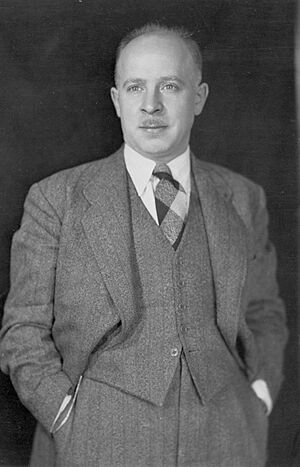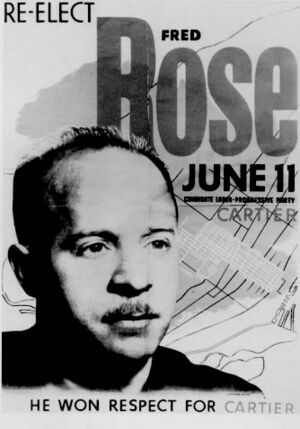Fred Rose (politician) facts for kids
Quick facts for kids
Fred Rose
|
|
|---|---|
 |
|
| Member of Parliament for Cartier |
|
| In office 9 August 1943 – 30 January 1947 |
|
| Preceded by | Peter Bercovitch |
| Succeeded by | Maurice Hartt |
| Personal details | |
| Born |
Fishel Rosenberg
7 December 1907 Lublin, Russian Empire |
| Died | 16 March 1983 (aged 75) Warsaw, Poland |
| Political party | Labor-Progressive |
| Residences | Montreal, Quebec |
| Occupation | Electrician |
Fred Rose (born Fishel Rosenberg; 7 December 1907 – 16 March 1983) was a Polish-Canadian politician and a leader in trade unions. He is known for being the only person in the Canadian Parliament ever accused of sharing secrets with another country. He was a member of the Communist Party of Canada and the Labor-Progressive Party. He served as a Member of Parliament (MP) for Cartier from 1943 to 1947. He lost his seat after being found guilty of planning to steal weapons research for the Soviet Union.
After leaving prison, Rose moved to Poland to start a business. While he was there, his Canadian citizenship was taken away. This meant he could not return to Canada. He tried to get his citizenship back, but he was not successful. However, in 1958, Ellen Fairclough, who was the Minister of Citizenship and Immigration, created a new rule called the "Fred Rose amendment." This rule was added to the Citizenship Act to make sure that Canadian citizenship could not be taken away in the same way ever again.
Contents
Fred Rose's Early Life
Fred Rose was born into a Polish Jewish family in Lublin. At that time, Lublin was part of the Russian Empire, but today it is in Poland. He was one of six children. He went to a Jewish high school where he learned to speak French. In 1920, when he was a child, he moved to Canada. He then went to Baron Byng High School in Canada.
Fred Rose and Communism
In 1925, Fred Rose joined the Young Communist League of Canada. Later, he became a member of the Communist Party of Canada while working in a canning factory. By 1928, the Royal Canadian Mounted Police started watching him. In 1931, he wrote a pamphlet where he explained his political goals. He believed the Communist Party of Canada should help Canadian workers create a system like the one in the Soviet Union.
During the 1930s, Rose was put in prison for his political ideas. He also angered Quebec Premier Maurice Duplessis by writing about Duplessis's connections to leaders like Adolf Hitler and Benito Mussolini. Rose was a close friend of Norman Bethune. Bethune was a doctor who helped fighters against fascism and communism in Spain during the Spanish Civil War and later in China.
Fred Rose's Political Career
Fred Rose ran for the Communist Party of Canada in the 1935 Canadian federal election. He ran in the working-class area of Cartier in Montreal. He came in second place in that election. In 1936, he ran in the 1936 Quebec general election for the Communist Party of Quebec and finished third.
At the start of World War II, the Communist Party of Canada was banned. Many of its leaders were put in prison because of the Padlock Law. After a big public effort, the party was allowed to restart under a new name: the Labor-Progressive Party.
In 1943, Rose ran as a Labor-Progressive candidate in a special election for the Cartier area. He won the election with 30% of the votes. He beat David Lewis and two other candidates. Fred Rose was the first, and so far, the only, Communist Party MP ever elected in Canada.
Rose was elected again in the 1945 Canadian federal election. Most of the Jewish people living in the area voted for Rose. They believed the Soviet Union was the best hope for saving Jewish people in Europe from Hitler. Rose's main opponent was Paul Massé, who was supported by most French-Canadians.
As a Member of Parliament, Fred Rose suggested the first federal laws for healthcare and the first laws against hate speech in Canada.
The Gouzenko Affair and Fred Rose
After World War II, the world changed. The Soviet Union, which had been an ally during the war, was now seen as an enemy in the new Cold War. In 1945, Igor Gouzenko, a young code clerk from the Soviet embassy in Ottawa, was called back to his home country. Instead of going back, Gouzenko left the embassy with secret documents. He claimed to have proof of a large Soviet spy group working in Canada and the United States.
At first, not many people believed Gouzenko's claims. But in February 1946, the government of William Lyon Mackenzie King started a special investigation called the Kellock–Taschereau Commission. This commission was led by two Supreme Court judges. They arrested Canadians named in Gouzenko's documents. These people were held without lawyers and could not contact anyone outside until they appeared before the commission.
Fred Rose was accused of leading a group of up to 20 Soviet spies. This group was said to be trying to get information about atomic weapons research from the Manhattan Project. Another person, Raymond Boyer, said that Rose was involved. Rose refused to speak to the commission. He said it was trying to unfairly blame honest Canadians. Rose was found guilty of planning to give information about an explosive called RDX to the Soviets. He was sent to prison for a term that was just long enough to make him lose his seat in the House of Commons.
On January 30, 1947, Fred Rose was officially removed from the House of Commons.
Fred Rose's Later Life
Fred Rose was released from prison in 1951 after four and a half years. He tried to find work in Montreal, but the Royal Canadian Mounted Police (RCMP) followed him. They told employers and co-workers that he was a convicted spy.
In 1953, he went to Poland. He hoped to start a business there and get medical treatment he could not afford in Canada. For many years, he worked as an English editor for Poland, a magazine about Polish culture. While he lived in Poland, his Canadian citizenship was taken away in 1957. This meant he could not return to Canada to try to clear his name.
His appeal to get his citizenship back was denied. However, in 1958, Minister of Citizenship and Immigration Ellen Fairclough introduced the "Fred Rose amendment" to the Citizenship Act. This new rule made sure that Canadian citizenship could not be taken away in the same way again. Years later, a former government minister, Allan MacEachen, said that some pages from Prime Minister William Lyon Mackenzie King's diary about Rose had gone missing. Most other records about his case were also gone.
Fred Rose died on March 16, 1983, in Warsaw. He never returned to Canada.
See also
- Communism in Quebec
- Communist Party of Canada
- Igor Gouzenko
- Maurice Duplessis
- Padlock Law
 | Emma Amos |
 | Edward Mitchell Bannister |
 | Larry D. Alexander |
 | Ernie Barnes |


